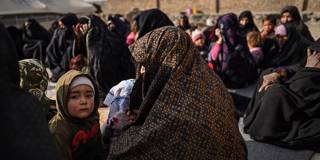Since the Taliban took power in Afghanistan, the US and its allies have watched and waited to see how the group would govern before deciding whether to recognize their leadership and lift financial sanctions. But as critical programs run out of funding and the threat of mass starvation looms, this approach is no longer tenable.
WASHINGTON, DC – The Afghan economy is in free fall. Public-sector employees –teachers, health-care workers, bureaucrats, police – are not being paid, the currency has lost a fifth of its value, and shortages of food, medicines, and everyday products are growing. Even when these items are available, many households cannot afford to buy them.
It was inevitable that the country’s takeover by the Taliban and the withdrawal of American and allied forces would leave most Afghans economically worse off and personally less free. Still, few anticipated the speed and scale of the humanitarian catastrophe now taking shape.
While the international community decides how to calibrate its response – or if it should respond at all – life in Afghanistan is becoming more difficult. Aid flows, which financed 75% of the country’s national budget before the Taliban seized power, have mostly dried up. The International Monetary Fund and the World Bank have halted their substantial funding. Afghanistan’s $7 billion of reserves in the United States have been frozen by President Joe Biden’s administration. And fear of violating sanctions has stopped banks and businesses from engaging even in permitted activities.

WASHINGTON, DC – The Afghan economy is in free fall. Public-sector employees –teachers, health-care workers, bureaucrats, police – are not being paid, the currency has lost a fifth of its value, and shortages of food, medicines, and everyday products are growing. Even when these items are available, many households cannot afford to buy them.
It was inevitable that the country’s takeover by the Taliban and the withdrawal of American and allied forces would leave most Afghans economically worse off and personally less free. Still, few anticipated the speed and scale of the humanitarian catastrophe now taking shape.
While the international community decides how to calibrate its response – or if it should respond at all – life in Afghanistan is becoming more difficult. Aid flows, which financed 75% of the country’s national budget before the Taliban seized power, have mostly dried up. The International Monetary Fund and the World Bank have halted their substantial funding. Afghanistan’s $7 billion of reserves in the United States have been frozen by President Joe Biden’s administration. And fear of violating sanctions has stopped banks and businesses from engaging even in permitted activities.